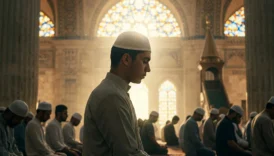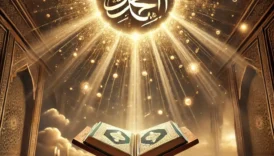What Is Laylat Al-Qadr?
Laylat al-Qadr, the Night of Decree, marks the revelation of the Qur’an. It is a night of abundant mercy, forgiveness, and spiritual renewal. Sincere worship, prayer, and reflection are highly rewarded. Laylat al-Qadr is considered one of the most sacred nights in Islam. It is the night when the Qur’an was first revealed to the Prophet Muhammad (peace be upon him) through the angel Jibreel. This divine event marks a turning point in human history and continues to inspire millions of believers around the world. The Qur’an itself emphasizes the greatness of this night, establishing it as a time when Allah’s mercy and blessings descend upon those who seek Him with a sincere heart.
(Tafsir Ibn Kathir, Tafsir al-Tabari)
Quranic Verses On Laylat Al-Qadr
The importance of Laylat al-Qadr is clearly outlined in Surah Al-Qadr. Below are the verses, presented in their original Arabic, followed by their transliteration and English translation.
Verse 1
Arabic:
إِنَّا أَنْزَلْنَاهُ فِي لَيْلَةِ الْقَدْرِ
Transliteration:
Inna anzalnahu fi laylatil-qadr
Translation:
Indeed, We sent down the Qur’an during the Night of Decree.
Verse 2
Arabic:
وَمَا أَدْرَاكَ مَا لَيْلَةُ الْقَدْرِ
Transliteration:
Wa ma adraka ma laylatul-qadr
Translation:
And what can make you know what is the Night of Decree?
Verse 3
Arabic:
لَيْلَةُ الْقَدْرِ خَيْرٌ مِنْ أَلْفِ شَهْرٍ
Transliteration:
Laylatul-qadr khayrun min alfi shahr
Translation:
The Night of Decree is better than a thousand months.
Verse 4
Arabic:
تَنَزَّلُ الْمَلَائِكَةُ وَالرُّوحُ فِيهَا بِإِذْنِ رَبِّهِمْ مِنْ كُلِّ أَمْرٍ
Transliteration:
Tanazzalu al-mala’ikatu wa ar-ruhu fiha bi-idhni rabbihim min kulli amr
Translation:
The angels and the Spirit descend therein by permission of their Lord for every matter.
Verse 5
Arabic:
سَلَامٌ هِيَ حَتَّىٰ مَطْلَعِ الْفَجْرِ
Transliteration:
Salamun hiya hatta matla’il-fajr
Translation:
Peace it is until the emergence of dawn.
(Surah Al-Qadr, Quran; Tafsir Ibn Kathir)
The Spiritual Virtues And Benefits
Laylat al-Qadr is celebrated for its unparalleled spiritual blessings. The Qur’an states that this single night holds the reward of a thousand months, emphasizing that acts of worship performed during this time have immense value. Believers are encouraged to engage in sincere prayers, recite the Qur’an with contemplation, and make heartfelt supplications. The night is a unique opportunity to seek forgiveness, cleanse one’s soul, and reconnect with Allah.
Many scholars have reflected on the transformative power of this night, noting that the rewards of good deeds are multiplied and sins are forgiven. In the stillness of Laylat al-Qadr, a believer may feel the weight of past transgressions lift, replaced by a renewed sense of hope and spiritual clarity.
(Riyadh as-Salihin, Sahih Muslim)
Prophetic Traditions About Laylat Al-Qadr
The Prophet Muhammad (peace be upon him) underscored the significance of Laylat al-Qadr through numerous authentic traditions. In Sahih Bukhari and Sahih Muslim, it is narrated that the Prophet said, “Whoever stands (in prayer) during Laylat al-Qadr out of faith and in the hope of reward, his previous sins will be forgiven.” This hadith not only highlights the immense mercy of Allah on this night but also serves as a powerful motivation for believers to maximize their acts of worship.
Other narrations indicate that the Prophet (peace be upon him) would intensify his worship during the last ten nights of Ramadan, with a special emphasis on the odd-numbered nights, which are believed to be more likely candidates for Laylat al-Qadr. Such traditions remind the Muslim community that this night is not only a historical milestone but also a living opportunity for spiritual growth and renewal.
(Sahih Bukhari, Sahih Muslim; Riyadh as-Salihin)
Recommended Acts Of Worship On Laylat Al-Qadr
During Laylat al-Qadr, Muslims are encouraged to devote themselves to various acts of worship that purify the heart and elevate the spirit.
- Night Prayers (Salat al-Layl):
Performing additional night prayers is a means to draw closer to Allah. These prayers, often accompanied by heartfelt recitations and quiet reflection, help to deepen one’s connection with the Divine.
- Qur’an Recitation:
Given that the Qur’an was revealed on this blessed night, reciting its verses holds special significance. It is advised to not only recite but also to ponder over the meanings, allowing the divine message to resonate deeply within the heart.
- Dhikr (Remembrance Of Allah):
Engaging in dhikr—repeatedly uttering phrases such as “SubhanAllah” (Glory be to Allah), “Alhamdulillah” (All praise is due to Allah), and “Allahu Akbar” (Allah is the Greatest)—helps cleanse the heart and focus the mind on the omnipresence of the Creator.
- Supplication (Du’a):
The night is a prime opportunity for making sincere supplications. One of the most beloved supplications during this time is: Arabic:
اللَّهُمَّ إِنَّكَ عَفُوٌّ تُحِبُّ الْعَفْوَ فَاعْفُ عَنِّي Transliteration:
Allahümme innaka ‘affûvvun tuhibbul ‘afve fa’fu ‘anni Translation:
O Allah, You are Most Forgiving, and You love forgiveness; so forgive me. Such du’as are not merely recitations but heartfelt appeals for mercy and a means to shed the burdens of past sins.
(Sahih Muslim, Riyadh as-Salihin)
Spiritual Reflection And Contemplation
Laylat al-Qadr is not just a night of active worship; it is also a time for deep spiritual reflection. In the quiet hours of the night, when distractions fade away, the believer has the opportunity to reflect on life, to seek repentance, and to renew his or her commitment to the path of righteousness.
Many scholars have emphasized the importance of introspection during this night. The serene atmosphere and the overwhelming sense of divine presence encourage believers to question their deeds, assess their spiritual progress, and set goals for personal improvement. It is a night when one can truly understand the magnitude of Allah’s mercy and the vastness of His grace.
Reflecting on the divine signs and the profound messages contained in the Qur’an, one may experience a deep sense of peace and spiritual awakening. This is the time to let go of worldly worries and focus on the eternal, seeking the light of guidance and the warmth of divine love.
(Ihya’ Ulum al-Din, Tafsir Ibn Kathir)
Personal Insights And Encouragement
As I reflect upon the magnificence of Laylat al-Qadr, my heart is filled with gratitude and hope. This sacred night is a reminder of Allah’s endless mercy and the transformative power of sincere worship. It is an opportunity to cleanse one’s soul, to mend broken connections, and to embark on a journey of spiritual renewal.
I encourage every believer to seize this blessed night with utmost sincerity. Set aside the distractions of daily life and immerse yourself in worship. Whether through prolonged prayers, heartfelt recitations of the Qur’an, or deep, contemplative du’as, let this night be a turning point in your spiritual journey. Embrace the silence, listen to the whispers of your heart, and let your prayers ascend to the heavens.
This night teaches us that no matter how heavy our burdens may seem, there is always hope for redemption and forgiveness. The spiritual treasures of Laylat al-Qadr are immense, offering a fresh start and a renewed sense of purpose. Allow yourself to be transformed by its light, and let every moment of worship deepen your relationship with Allah.
(Riyadh as-Salihin, Sahih Bukhari)
Final Words
Laylat al-Qadr stands as a beacon of divine mercy and a testament to Allah’s boundless generosity. It is a night when the heavens open wide with blessings, and the faithful are granted an opportunity to start anew. The rewards of sincere worship on this night are beyond measure, and its significance is eternally etched in the hearts of Muslims worldwide.
Let this sacred night inspire you to seek forgiveness, to renew your commitment, and to approach Allah with a heart full of humility and hope. May the light of Laylat al-Qadr guide you through the darkness and fill your life with peace, prosperity, and endless blessings.
(Sahih Muslim, Riyadh as-Salihin)
References
- Sahih Bukhari – Fath al-Bari
- Sahih Muslim
- Tafsir Ibn Kathir
- Tafsir al-Tabari
- Riyadh as-Salihin, Imam Nawawi
- Ihya’ Ulum al-Din, Imam Ghazali
- Muwatta Malik





